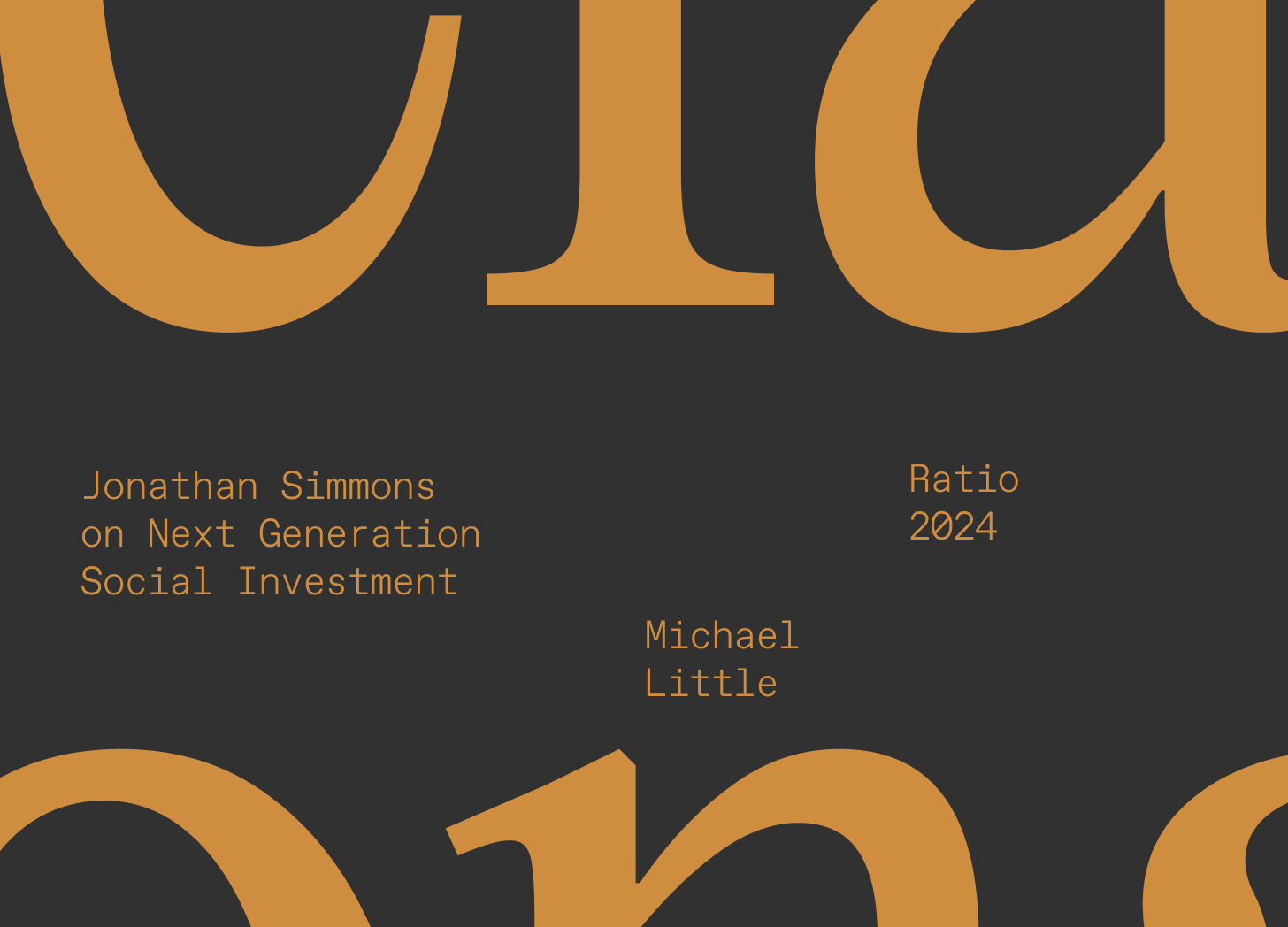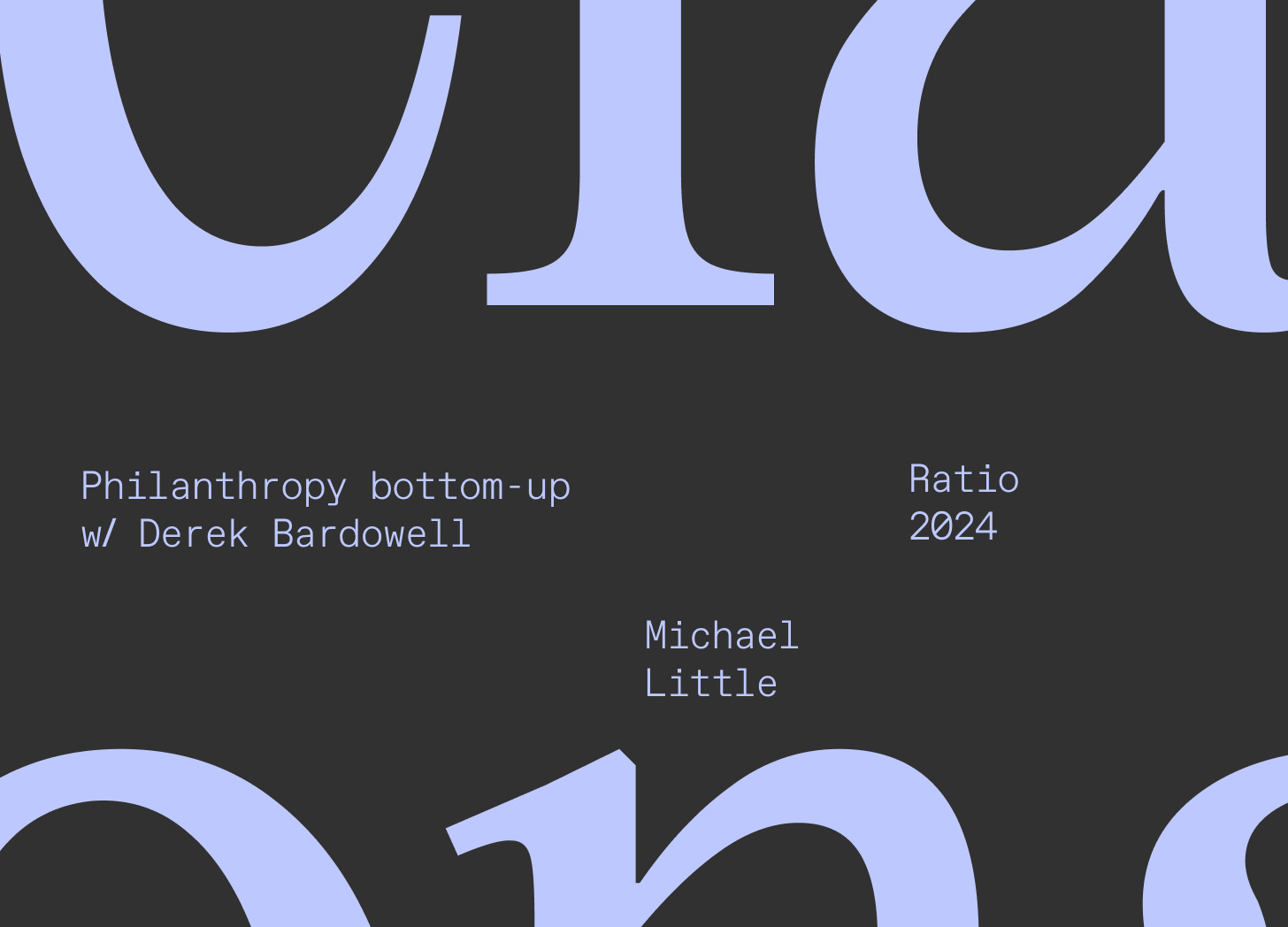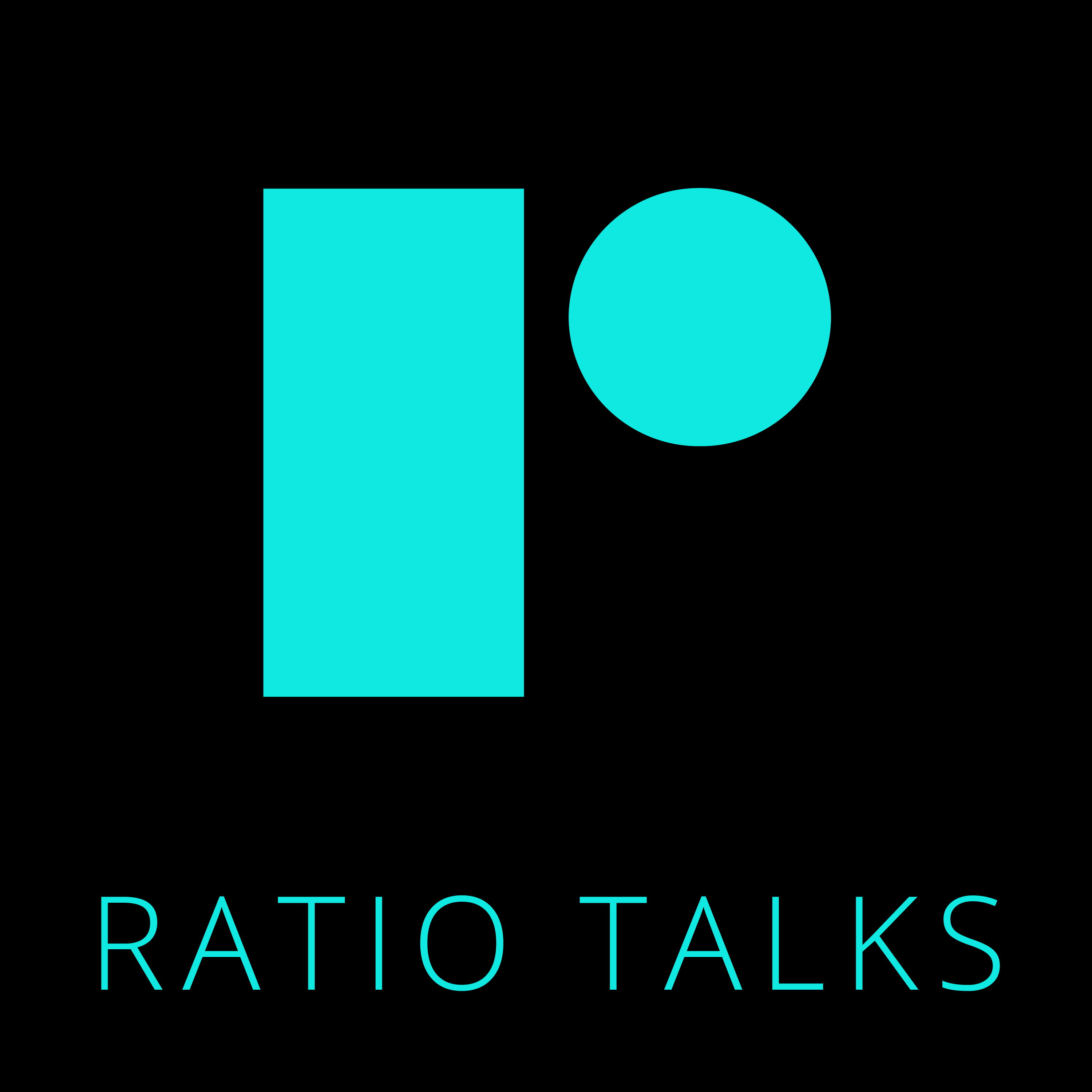Discover Ratio Talks
Ratio Talks

62 Episodes
Reverse
The Ratio Talks podcast is currently exploring the potential for a ‘relational social policy’, one that seeks an optimal balance between two powerful forces, a big civil society and a small state. The ideas are summarised in this paper and this podcast. The first episodes in the series are considering the implications of a relational social policy for philanthropy. A fortnight ago we talked to Géraud de Ville de Goyet from Barking and Dagenham Giving, a new way of thinking about investing in place.In this episode we talk to Jonathan Simmons, an entrepreneur who has switched his attention to social investment. In this episode, he talks about his partnership with Géraud and BD_Giving. Jonathan is looking to invest in local businesses that deliver a social good. The U.K. is often thought of as being at the forefront of social investment, but Jonathan has found it difficult to raise the money for his new venture. Jonathan’s story tell us a lot about the challenge of thinking differently about giving, and about widening our gaze from service providers to the full span of civil society.Pritpal S. Tamber, international expert on community power joins the conversation at the end to draw out the main themes.The conversation between Michael and Pritpal reflects their views.Subscribe to Ratio’s Newsletter here and find out more about Pritpal S Tamber’s work here.Ratio Talks is available on Substack and on Apple Podcasts.Get in touch with us any time by sending an email to hello@ratio.org.uk.Ratio Talks is produced with the help of sound designer Nik Paget-Tomlinson and creative director Richard De Angelis. The show’s theme song is by Luca Picardi. This is a public episode. If you would like to discuss this with other subscribers or get access to bonus episodes, visit thisisratio.substack.com
Relational social policy seeks an optimal balance between two powerful forces, a big civil society and a small state. The ideas are summarised in this paper and this podcast. For the next month or so the substack and podcast series focuses on the implications of a relational social policy for philanthropy.Derek Bardowell, CEO of 10 Years Time, starts the conversation with a reflection on his most recent book Giving Back, a personal memoir of the limitations of orthodox philanthropy, and a treatise on how to release its potential. At the end of the episode, Pritpal S. Tamber, Ratio Talks resident critic, gives his reflections.Show NotesIn their conversation, Michael, Derek and Pritpal refer to:* Felton Earls and Maya Carlson’s book Voice, Choice and Acton: The Potential of Young Citizens to Heal Democracy, Harvard University Press* Thomas Piketty’s book Capital in the Twenty-First Century, Harvard University Press* Matthew Desmond’s ground breaking article in the American Journal of Sociology in March 2012 Disposable Ties and the Urban Poor. This is the focus of next week’s contribution to the Relational Social Policy Substack* Angela Glover Maxwell’s article How We Achieve a Multiracial Democracy was published in the Spring 2023 edition of the Stanford Social Innovation Review* Susan Wolf Ditkoff and Abe Grindle’s article Audacious Philanthropy was published in the Harvard Business Review in October 2017, and is the focus of a future article on the Substack* One of many obituaries to Chuck Feeney, who coined the phrase ‘giving while living’ is available on the Atlantic Philanthropies website* The conversation with Katherine Zappone about the path to liberation and social change is available here * As is the conversation with Tony Iton about how communities in California are pursuing health equity through structural change* Peter Townsend’s seminal book Poverty in the United Kingdom was published in 1979.The conversation between Michael and Pritpal reflects their views.Subscribe to Ratio’s Newsletter here and find out more about Pritpal S Tamber’s work here.Ratio Talks is available on Substack and on Apple Podcasts.Get in touch with us any time by sending an email to hello@ratio.org.uk.Ratio Talks is produced with the help of sound designer Nik Paget-Tomlinson and creative director Richard De Angelis. The show’s theme song is by Luca Picardi. This is a public episode. If you would like to discuss this with other subscribers or get access to bonus episodes, visit thisisratio.substack.com
What if most of the heavy lifting to keep us healthy and get us through tough times was done by civil society? Not the organisations of civil society, but the conversations, mutual aid and moral order we naturally create in our day to day interactions. What if civil society was the primary catalyst for social change? And what if civil society is at the heart of effective responses to natural disasters and pandemics? What would this mean for the state, services, and democracy?Each Thursday, I talk on the Ratio Talks podcast with someone who has thought more about these issues than me, or reflect on the work of people who have given their lives to this way of thinking.My starting point is this paper. It will get updated as I learn.The series starts with the co-curator of the last series of the Ratio Talks podcast on community power, Pritpal S. Tamber. In this first podcast, Pritpal asks me about the paper sitting at the heart of this Substack, about the balance between civil society and state, and about the potential for a relational social policy.You can hear in his voice that he is interested, that he sees potential in the ideas, but that they are a long way from being battened down.If the conversation captures your imagination, check in here for another reflection next Thursday or/and subscribe to my Substack .Show NotesIn my conversation with Pritpal we refer to:* Relational Social Policy Paper, the basis of the new Ratio Talks series * The early study Bringing Everything I Am Into One Place that led to the establishment of Ratio and the work described in the podcast* ‘s series of published papers on how a one-to-one relationship, independent of, or over and above any intervention, makes a difference to health. They are summarised in an overview called Relational Worker* Robert Putnam and Shaylyn Romney Garrett’s book The Upswing, first published in 2020 is available from all good bookshops* Aron Antonovsky’s work on how a sense of coherence about life contributed to better health. This idea is developed in the 1979 book Health, Stress and Coping* Jürgen Habermas’s work has had a strong influence on my ideas. It is a wide opus but James Gordon Finlayson’s Habermas: A Very Short Introduction is a good place to start.* Pro-bono Economics produced a valuable if narrow perspective on civil society and its economic value in Unleashing the Power of Civil Society in 2023* The Lancet Commission on the Value of Death provides a good illustration of the effects of an imbalance between civil society and state, and a good summary of Allan Kellehear’s work on how civil society does 95 per cent of the support in the last years of life, and after death.* Rebecca Solnit’s A Paradise Built in Hell: The Extraordinary Communities That Arise in Disaster was published in 2009.Subscribe to Ratio’s Newsletter here and find out more about Pritpal S Tamber’s work here.Get in touch with us any time by sending an email to hello@ratio.org.uk.Ratio Talks is produced with the help of sound designer Nik Paget-Tomlinson and creative director Richard De Angelis. The show’s theme song and image is by Luca Picardi. This is a public episode. If you would like to discuss this with other subscribers or get access to bonus episodes, visit thisisratio.substack.com
In this episode, Michael, Ratio Talks’s co-host, and Pritpal, our resident community power expert who’s based in Sao Paolo, Brazil, meet for the first time in person to conclude the podcast series. They discuss the series as a whole and the observations that listeners in Australia, the United States and England sent to us in short audio memos.The conversation starts off with the phrase that touched everyone’s chord: powerlessness kills from podcast guest Tony Iton of California Endowment.In their conversation, Michael and Pritpal mention:john a. powell, director of Othering and Belonging InstituteSir Michael Marmot on the social determinants of healthThe Nuka System of CareUpswing by Robert Putnam and Shaylyn Romney GarrettSherry R Arnstein’s ladder of participationThe epilogue between Michael and Pritpal reflects their views.Subscribe to Ratio’s Newsletter here and find out more about Pritpal S Tamber’s work here.Get in touch with us any time by sending an email to hello@ratio.org.uk.Ratio Talks is produced with the help of sound designer Nik Paget-Tomlinson and creative director Richard De Angelis. The show’s theme song is by Luca Picardi.***In this series, Michael is exploring community power — what it is, how it’s linked to better outcomes, such as health, and what its limitations are. The series is in collaboration with Pritpal S Tamber, a researcher and consultant on the link between community power and health, and a Non-Executive Director of Ratio. This is a public episode. If you would like to discuss this with other subscribers or get access to bonus episodes, visit thisisratio.substack.com
In this episode, Michael talks to Donna Hall, the former Chief Executive at Wigan Council. During the UK government’s austerity programme, the council suffered the third worst cuts in the UK – about £100 million. In response, Donna explored and initiated a new way of working with the people of Wigan, one that involved a deeper, less transactional relationship with them and built from their aspirations and ‘assets’.Although the work (now called the Wigan Deal) is not the same as community power, as described in this series, it has paved the way for the public sector in the UK to understand what it might mean to work with communities with power. The Wigan Deal was extensively described an analysed in this body of work from the King’s Fund, a health think tank in England.The epilogue between Michael and Pritpal reflects their views, not necessarily Donna’s.Subscribe to Ratio’s Newsletter here and find out more about Pritpal S Tamber’s work here.Get in touch with us any time by sending an email to hello@ratio.org.uk.Ratio Talks is produced with the help of sound designer Nik Paget-Tomlinson and creative director Richard De Angelis. The show’s theme song is by Luca Picardi. In this series, Michael is exploring community power — what it is, how it’s linked to better outcomes, such as health, and what its limitations are. The series is in collaboration with Pritpal S Tamber, a researcher and consultant on the link between community power and health, and a Non-Executive Director of Ratio. This is a public episode. If you would like to discuss this with other subscribers or get access to bonus episodes, visit thisisratio.substack.com
In this episode, Michael talks to Tony Iton, a Senior Vice President of the California Endowment, the foundation that has placed people power at the heart of its strategy for health equity. Tony describes how, as the former Health Officer of Alameda County Public Health Department, he came to appreciate the importance of resources and opportunities to health, and the role that structures play within that. And he gives examples of how organised communities across California have changed their conditions.As mentioned in the episode, Tony and Pritpal have been working together for the last few years. They have produced a review of the health research linking community power and health and a Policy Insight article in Health Affairs, entitled Building Community Power To Dismantle Policy-Based Structural Inequity In Population Health. Their work is ongoing.The epilogue between Michael and Pritpal reflects their views, not necessarily Tony’s.Subscribe to Ratio’s Newsletter here and find out more about Pritpal S Tamber’s work here.Get in touch with us any time by sending an email to hello@ratio.org.uk.Ratio Talks is produced with the help of sound designer Nik Paget-Tomlinson and creative director Richard De Angelis. The show’s theme song is by Luca Picardi.In this series, Michael is exploring community power — what it is, how it’s linked to better outcomes, such as health, and what its limitations are. The series is in collaboration with Pritpal S Tamber, a researcher and consultant on the link between community power and health, and a Non-Executive Director of Ratio. This is a public episode. If you would like to discuss this with other subscribers or get access to bonus episodes, visit thisisratio.substack.com
In this episode, Michael talks to Katherine Zappone, one of the architects of same-sex marriage in Ireland. Katherine describes her early work, with her partner and fellow educator, Ann Louise Gillighan, in providing ‘classes’ to local working-class women to help build their confidence. Their approach was to create a dialogue with the women that might spur them to action. It was a similar approach to the one made famous by Paulo Freire, the Brazilian educator with whom they occasionally collaborated with. In the community organising world, this way of working might be described as part of base building. Katherine then goes on to describe their work to make same-sex marriage possible in Ireland of which there is a documentary.The epilogue between Michael and Pritpal reflects their views, not necessarily Katherine’s.Subscribe to Ratio’s Newsletter here and find out more about Pritpal S Tamber’s work here.Get in touch with us any time by sending an email to hello@ratio.org.uk.Ratio Talks is produced with the help of sound designer Nik Paget-Tomlinson and creative director Richard De Angelis. The show’s theme song is by Luca Picardi.In this series, Michael is exploring community power — what it is, how it’s linked to better outcomes, such as health, and what its limitations are. The series is in collaboration with Pritpal S Tamber, a researcher and consultant on the link between community power and health, and a Non-Executive Director of Ratio. This is a public episode. If you would like to discuss this with other subscribers or get access to bonus episodes, visit thisisratio.substack.com
In this episode, Michael talks to three organisers, Olivia Masoja, Marzena Zukowska, and Stephanie Wong. They talk about how power is built, the importance of relationships, and how what’s key to societal change is the pursuit of justice rather than the provision of charity.The epilogue between Michael and Pritpal reflects their views, not necessarily the organisers’.Subscribe to Ratio’s Newsletter here and find out more about Pritpal S Tamber’s work here.Get in touch with us any time by sending an email to hello@ratio.org.uk.Ratio Talks is produced with the help of sound designer Nik Paget-Tomlinson and creative director Richard De Angelis. The show’s theme song is by Luca Picardi.In this series, Michael is exploring community power — what it is, how it’s linked to better outcomes, such as health, and what its limitations are. The series is in collaboration with Pritpal S Tamber, a researcher and consultant on the link between community power and health, and a Non-Executive Director of Ratio. This is a public episode. If you would like to discuss this with other subscribers or get access to bonus episodes, visit thisisratio.substack.com
In this episode, Michael talks to Leigh Carroll, an organiser with United Homecare Workers of Pennsylvania, and Lynn Weidner, a member organiser within the same union. Homecare workers often work without health insurance, paid leave, sick leave and paid overtime. Lynn describes what it was like working in such conditions and how things have changed since joining the union. Leigh describes the work of a union organiser and why it’s about more than pickets and placards.The epilogue between Michael and Pritpal reflects their views, not necessarily Leigh’s or Lynn’s.Subscribe to Ratio’s Newsletter here and find out more about Pritpal S Tamber’s work here.Get in touch with us any time by sending an email to hello@ratio.org.uk.Ratio Talks is produced with the help of sound designer Nik Paget-Tomlinson and creative director Richard De Angelis. The show’s theme song is by Luca Picardi.In this series, Michael is exploring community power — what it is, how it’s linked to better outcomes, such as health, and what its limitations are. The series is in collaboration with Pritpal S Tamber, a researcher and consultant on the link between community power and health, and a Non-Executive Director of Ratio. This is a public episode. If you would like to discuss this with other subscribers or get access to bonus episodes, visit thisisratio.substack.com
In this episode, Michael talks to Martha Mackenzie, Executive Director of the UK-based Civic Power Fund. Martha describes what community organising is, how it creates power in communities, and what it means for democracy. Martha also talks about why community power seems to be in vogue in the UK right now. Along the way, Martha mentions:The work of Jane Mcalevey, an organiser, scholar and authorThe ideas of Ella Baker, a largely behind-the-scenes organiser who worked alongside the likes of Martin Luther King Jr.And Neil Stott, now a professor at the University of Cambridge and previously a leader in the practice of community developmentThe epilogue between Michael and Pritpal reflects their views, not necessarily Martha's.Subscribe to Ratio’s Newsletter here and find out more about Pritpal S Tamber’s work here.Get in touch with us any time by sending an email to hello@ratio.org.uk.Ratio Talks is produced with the help of sound designer Nik Paget-Tomlinson and creative director Richard De Angelis. The show’s theme song is by Luca Picardi. In this series, Michael is exploring community power — what it is, how it’s linked to better outcomes, such as health, and what its limitations are. The series is in collaboration with Pritpal S Tamber, a researcher and consultant on the link between community power and health, and a Non-Executive Director of Ratio. This is a public episode. If you would like to discuss this with other subscribers or get access to bonus episodes, visit thisisratio.substack.com
In this episode, Michael talks to Paul W. Speer, a Professor in the Department of Human and Organizational Development at Peabody College in Vanderbilt University. Paul shares his insights through a series of anecdotes. To learn more about Paul’s work, consider the following:Paul is worried about our ability to form relationships; he explains why in this 2018 article describing three interrelated trends threatening developing social relationshipsAlthough he does not mention it in the episode, Paul is clear-eyed about what kind of change matters. He calls it ‘restructuring’, which is described in this 1988 article by Edward Seidman, a Professor of Applied Psychology at NYUPaul and colleagues have studied ISAIAH, a multi-racial, nonpartisan coalition of faith communities fighting for racial and economic justice in Minnesota. It’s considered to be at the leading edge of how community power can pursue equity. See Paul’s study hereThe epilogue between Michael and Pritpal reflects their views, not necessarily Paul’s.Subscribe to Ratio’s Newsletter here and find out more about Pritpal S Tamber’s work here.Get in touch with us any time by sending an email to hello@ratio.org.uk.Ratio Talks is produced with the help of sound designer Nik Paget-Tomlinson and creative director Richard De Angelis. The show’s theme song is by Luca Picardi. In this series, Michael is exploring community power — what it is, how it’s linked to better outcomes, such as health, and what its limitations are. The series is in collaboration with Pritpal S Tamber, a researcher and consultant on the link between community power and health, and a Non-Executive Director of Ratio. This is a public episode. If you would like to discuss this with other subscribers or get access to bonus episodes, visit thisisratio.substack.com
In this episode, Michael talks to Jennie Popay, a Distinguished Professor of Sociology and Public Health at Lancaster University in the UK.Jennie’s insights on the outward gaze and the Emancipatory Power Framework were described in the article, Power, control, communities and health inequalities I: theories, concepts and analytical frameworks, published in Health Promotion InternationalHer view on the need to ‘map’ power in communities refers to the Emancipatory Power Framework and the Limiting Power Framework, the latter of which is also described in the above articleLimiting Power Framework draws on Barnett and Duvall’s 2005 article on how power is inadequately conceptualised and Gaventa’s 2009 article on the nature of power relationships in citizen engagementThe aforementioned article in Health Promotion International is the first of a trilogy; the second looks at how to measure shifts in power and the third looks at the role of spaces in the process of power shiftingThe trilogy of articles described above are based on their analysis of 15 of the 150 localities in Big Local, a long-term ‘empowerment’ initiative in EnglandThe multimedia evaluation of Big Local, which Jennie mentions, can be found here Jennie’s ideas on resilience, including the ‘neighbourhood system resilience’ model were described in the article, System resilience and neighbourhood action on social determinants of health inequalities: an English Case Study, published in Perspectives in Public HealthAnd her analysis of the impact of community empowerment initiatives on the mental wellbeing of participants is described in the article, Community empowerment and mental wellbeing: longitudinal findings from a survey of people actively involved in the big local place-based initiative in England, published in the Journal of Public HealthThe epilogue between Michael and Pritpal reflects their views, not necessarily Jennie’s.Subscribe to Ratio’s Newsletter here and find out more about Pritpal S Tamber’s work here.Get in touch with us any time by sending an email to hello@ratio.org.uk.Ratio Talks is produced with the help of sound designer Nik Paget-Tomlinson and creative director Richard De Angelis. The show’s theme song is by Luca Picardi. In this series, Michael is exploring community power — what it is, how it’s linked to better outcomes, such as health, and what its limitations are. The series is in collaboration with Pritpal S Tamber, a researcher and consultant on the link between community power and health. This is a public episode. If you would like to discuss this with other subscribers or get access to bonus episodes, visit thisisratio.substack.com
In this episode, Michael talks to Jonathan Heller, co-founder of Human Impact Partners and co-creator of the Health Equity Guide. Jonathan mentions the following:Margaret Whitehead’s definition of inequity in health, which was taken from her seminal paper, The concepts and principles of equity and health [PubMed]The Health Equity Guide, a project of Human Impact Partners showcasing strategic practices to confront the power imbalances that are at the root of health inequitiesSteven Lukes’ theory of power having three faces, which you can read about in the new edition of his seminal book or listen to in this podcast episodeSystemic and structural racism, which you can learn more about in this 2022 article by Paula A Braveman and colleaguesA report by USC Dornsife’s Equity Research Institute (see the bottom of this page) that includes a definition of community power (see below) The definition of community power that Jonathan uses is the ability of communities most impacted by structural inequity to develop, sustain, and grow an organized base of people who act together through democratic structures to set agendas, shift public discourse, influence who makes decisions, and cultivate ongoing relationships of mutual accountability with decision makers that change systems and advance health equity (see the bullet above for the source).Related reading:For an excellent discussion on why ‘behaviour change’ endures in health promotion despite its failure to reduce health inequities see Baum & Fisher 2014 [PubMed]Jonathan has created a short course with the University of Wisconsin entitled ‘Building Power for Health Equity’, the impressive syllabus of which is available onlineSubscribe to Ratio’s Newsletter here and find out more about Pritpal S Tamber’s work here.Get in touch with us any time by sending an email to hello@ratio.org.uk.Ratio Talks is produced with the help of sound designer Nik Paget-Tomlinson and creative director Richard De Angelis. The show’s theme song is by Luca Picardi. In this series, Michael is exploring community power — what it is, how it’s linked to better outcomes, such as health, and what its limitations are. The series is in collaboration with Pritpal S Tamber, a researcher and consultant on the link between community power and health, and a Non-Executive Director of Ratio. This is a public episode. If you would like to discuss this with other subscribers or get access to bonus episodes, visit thisisratio.substack.com
In this episode, Pritpal sets the scene on what is community power and why it is so important. He mentions the following: Control and Health: An Epidemiological perspective: A 1990 book chapter by S. Leonard SymeHow could differences in ‘control over destiny’ lead to socio-economic inequalities in health? A synthesis of theories and pathways in the living environment: A 2016 research article by Margaret Whitehead and colleagues Social determinants of health: WHO’s definition that mentions the “forces and systems” that shape daily lifeHealth Equity Guide: A project of Human Impact Partners (Oakland, CA, USA) showcasing strategic practices to confront the power imbalances that are at the root of health inequitiesPower, control, communities and health inequalities I: theories, concepts and analytical frameworks: A 2021 research article by Jennie Popay and colleagues that describes the inward and outward gaze of community power Communities of Opportunity: The project in King County (Washington State, USA) in which the health department is working towards making itself accountable to communities Pritpal’s full definition of community power builds on the work of the USC Dornsife Equity Research Institute (see below) and was developed with Anthony Iton and Robert K Ross of the California Endowment. It is the ability of people facing similar circumstances to develop, sustain, and grow an organized base of people who act together through democratic structures to set agendas, shift public discourse, influence who makes decisions, and cultivate ongoing relationships of mutual accountability with decision makers who change systems and advance health equity. Related reading: For an excellent discussion of systemic and structural bias (such as racism), see this 2022 article by Paula A Braveman and colleagues For a deeper understanding of community power-building, including a definition of base building, see this 2020 report by the USC Dornsife Equity Research Institute (second report on the page)Subscribe to Ratio’s Newsletter here and find out more about Pritpal S Tamber’s work here.Get in touch with us any time by sending an email to hello@ratio.org.uk. Ratio Talks is produced with the help of sound designer This is a public episode. If you would like to discuss this with other subscribers or get access to bonus episodes, visit thisisratio.substack.com
We conclude this series of podcasts linked to the publication How To Be Wrong with Don Berwick, renowned health policy maker and scientist. Don’s short paper Era 3 for Medicine and Health Care was the catalyst for the network that produced the How To Be Wrong paper. In this podcast, Don reflects on the paper, its reception and the prospects for new ways of thinking about learning.Mentioned in this podcast:Don Berwick's Era 3 paper Change from the Inside Out, Health Care Leaders Taking the HelmCOVID has Made the Office Visit a Dinosaur This is a public episode. If you would like to discuss this with other subscribers or get access to bonus episodes, visit thisisratio.substack.com
Frank Oberklaid is a paediatrician at the Royal Melbourne Children’s Hospital where he founded the Centre for Community Child Health. During the podcast Frank referred to several pioneers in the field of paediatrics:Robert Haggerty’s work includes Stress, Risk, and Resilience in Children and Adolescents, a book edited with Lonnie Sherod, Norman Garmezy and Michael Rutter in 1994 long before the word resilience became in vogue.Mel Levine was Professor of Pediatrics at the University of North Carolina Medical School in Chapel Hill. Here (embed the link) is a brief video of him talking about ripple effects, the way in which one problem in childhood leads to, and reinforces another. https://childrenofthecode.org/interviews/levine.htmIn his obituary the New York Times described Berry Brazelton as “America’s most celebrated baby doctor since Benjamin Spock and the pediatrician who revolutionized our understanding of how children develop psychologically”. Here he is talking about his concept of ‘touchpoints’.Alexander Thomas and Stella Chess used the New York Longitudinal Study, beginning in 1956, to understand the role of temperament on child well-being. They classified children according to their temperament into three groups: easy -reacting to difficult situations without too much stress”; difficult -tending to withdraw from or find it hard to adapt to difficult situations; and slow warmers -low energy children who found it hard to maintain a positive outlook. This is a public episode. If you would like to discuss this with other subscribers or get access to bonus episodes, visit thisisratio.substack.com
Nick Chater is Professor of Behavioural Science at the Warwick Business School, and author with George Loewenstein of The i-Frame and the s-Frame: How Focusing on Individual-Level Solutions Has Led Behavioral Public Policy Astray. The i-frame refers to science and policy focused on changing individuals. The s-frame concentrates on everything around the individual. As Nick explains in this episode, our hunger in the last decades for the i-frame has diverted our attention from the benefits of the s-frame. ReferencesDellaVigna and Linos (2022) evidence from 2 nudge unitsHagmann , Ho , and Loewenstein (2019) nudging out support for carbon tax This is a public episode. If you would like to discuss this with other subscribers or get access to bonus episodes, visit thisisratio.substack.com
Sarah Davidson is Chief Executive of Carnegie UK Trust. Echoing Patrick McCarthy in the last podcast, Sarah brings to the work of the Trust her experience as a senior civil servant in Scottish Government. Carnegie Trust is focused on Collective Well-being. In this episode Sarah discusses the shifting culture of funding and learning within the Trust and pushing beyond ‘performance’ to authentic accountability. This is a public episode. If you would like to discuss this with other subscribers or get access to bonus episodes, visit thisisratio.substack.com
Patrick McCarthy is past President of the Annie E. Casey Foundation, the largest funder of social change for children and families in the United States. The Foundation is strongly invested in disadvantaged communities. Not all of those investments have paid off, but a commitment to evidence means there is always a legacy of learning. Patrick takes us through some of the lessons he has learned in over 30 years of public service, with a particular eye to the do's and don’ts of working in place. This is a public episode. If you would like to discuss this with other subscribers or get access to bonus episodes, visit thisisratio.substack.com
Ann Johnson and Dan Hastings are the focus for place based work in Telford and Great Yarmouth. Their efforts are the result of a new way of working for the Lloyds Bank Foundation. Not so much about money. Or power. More about acting as the catalyst for new conversations about public policy. The work is new. It started in the pandemic. In this episode Ann and Dan give an honest, straightforward description of progress and setbacks. Read more about the Lloyds Bank work at: https://www.lloydsbankfoundation.org.uk/we-develop/transforming-and-strengthening-services/people-and-communities This is a public episode. If you would like to discuss this with other subscribers or get access to bonus episodes, visit thisisratio.substack.com
























